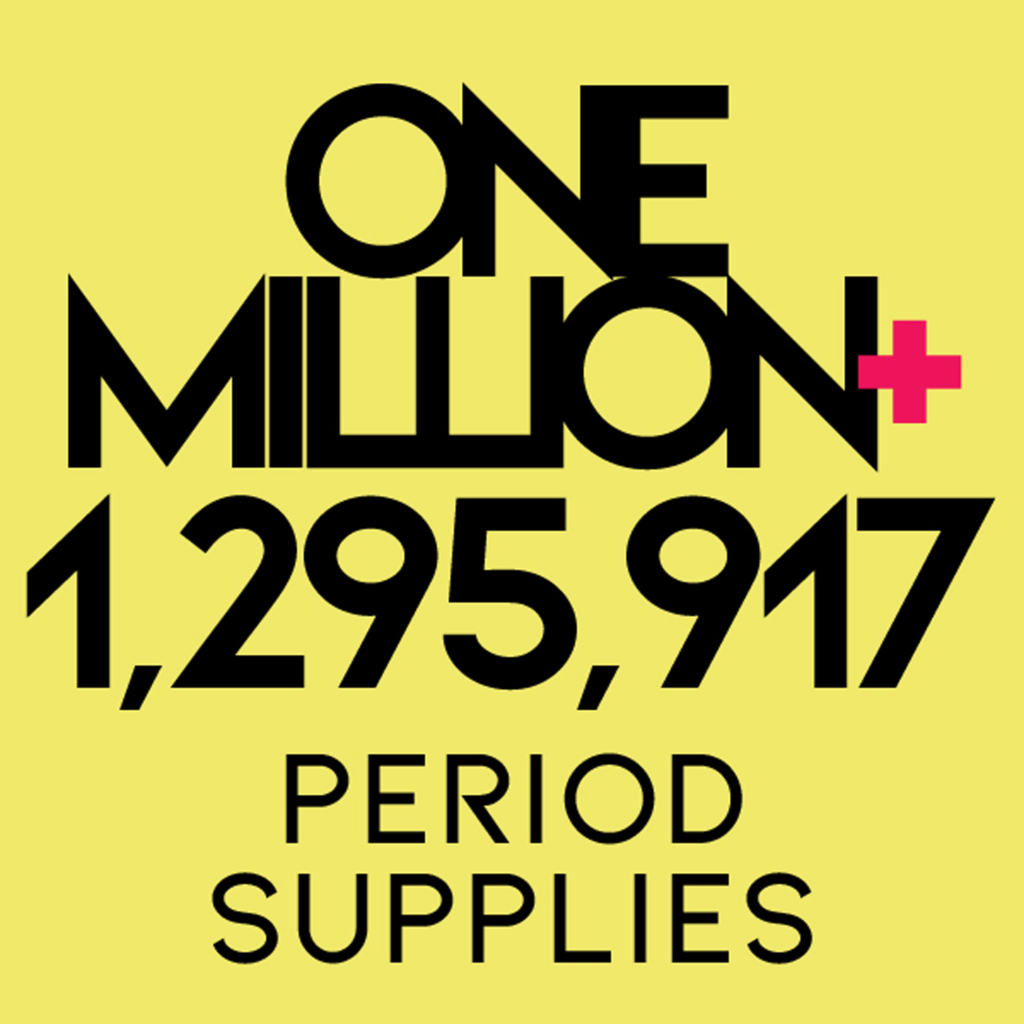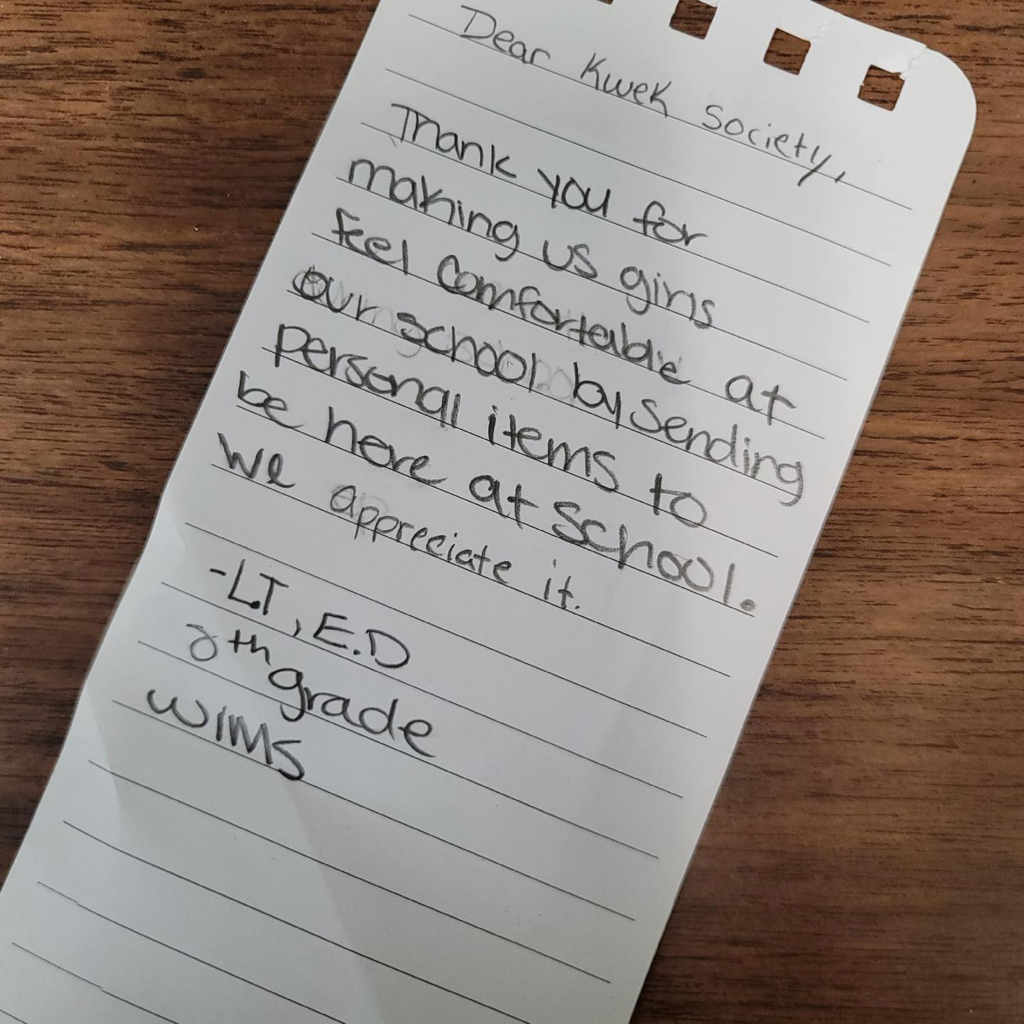The Kwek Society, founded in 2018 by CPN District 2 Legislator and humanitarian immigration lawyer Eva Marie Carney, is a nonprofit organization addressing period poverty in Indian Country. In 2022, the organization saw several significant expansions in partnerships and services rendered as well as media coverage and recognition for their work.
The Kwek Society supports the dignity and health of Indigenous students and community members by providing a wide range of menstrual products, puberty education materials and traditional teachings about puberty and “moon times.” Though the organization initially focused on rural reservations, it expanded quickly to reach cities and suburbs. It now partners with nearly 100 schools, clubs and nonprofit organizations assisting Indigenous communities throughout North America. Among its board members are six CPN citizens: Susie Howard (VT), Kimberly Chatfield Pratt (VA), Pam Vrooman (OK), Kathy Meacham Webb (TN), Paige Willett (OK), and Tesia Zientek (OK).
In August, the organization surpassed 1 million supplies donated, reaching nearly 1.3 million by the end of 2022.

Also in August, the organization was named one of 50 “Period Heroes” throughout the United States by Walmart and Always. The recognition came with a substantial donation of Always pads, which The Kwek Society distributed to school districts in New Mexico, Oklahoma and Wyoming.
Native News Online’s coverage (cpn.news/nnokwek) of the organization foregrounded community members’ points of view and advocacy, which excited founder Eva Marie Carney.
“Hearing directly from those we are supporting is so valuable,” she said.
2022 brought growth in funding partnerships as well, including several different sovereign Nations. Carney noted that a number of Potawatomi Nations, including CPN, have stepped up to offer ongoing support.
“That was always my idea — to obtain support from Native Nations,” she said. “And we certainly see that many of our individual donors are Native people who want to help their relatives, and I think that has been one of the reasons that we’ve been able to continue to grow.”
Most recently, the Prairie Band Potawatomi Nation’s contributions helped to fund The Kwek Society’s new partnership with Haskell Indian Nations University — their first university partner — as well as other schools and organizations throughout Turtle Island.
Period poverty
The term “period poverty” refers to a lack of access to menstrual products, education and other menstrual management necessities and often affects isolated and impoverished individuals and communities most. In turn, this lack of resources inhibits many menstruators from returning to work or school and — if menstruators are forced to turn to toilet paper, rags or socks — can result in serious health issues.
“Period poverty is an unjust, unconscionable problem across North America, not just in Indian Country,” Carney said. “As many as one in four students in the United States can’t afford needed period supplies.”
Over 500 million menstruators globally lack access to proper menstrual products and hygiene facilities, and an estimated 16.9 million people who menstruate live in poverty in the United States, according to a 2021 Medical News Today report.
Poverty impacts Native communities at an outsized rate compared to other racial and ethnic groups in the U.S. — 24.3 percent according to 2021 U.S. Census data — due to centuries of systemic impoverishment and isolation by the U.S. federal government.
“I think a lot of people overlook just how much inequality and poverty there still is in the United States,” said Tribal member and Kwek Society supporter Emily Rosewitz. “A lot of people choose to do missions and choose to do a lot of their work abroad, and that is fabulous. But I think it’s really important to look at our own communities and see where we can help and where we can raise up the people in our own communities so that they can be their best selves and live their best lives before we start moving farther away.”
The Kwek Society, she added, “does a big job while still having a very local feel. It’s very hands on and very intimate. We are helping out women and girls in our own communities, even though our community is spread all across North America.”
The Kwek Society board member Winona Elliot resides in Neyaashiinigmiing First Nation, one of the largest Potawatomi settlements in Canada, located on the Bruce Peninsula. She works professionally in the Native child welfare sector.
Elliot has facilitated partnerships between The Kwek Society and four First Nations and five community organizations in her area. She spoke with the Hownikan about the barriers to period supply access that impact the groups in Ontario that The Kwek Society serves.
Particularly in northern Ontario, period supplies present an enormous financial burden, ranging in price from CA$15-20 (US, $11-15) per box. One of the First Nations partners is located on a small island in Gregorian Bay, and others are fly-in communities. The geographic isolation exacerbates lack of ready access to period products. The coronavirus pandemic only compounded those barriers.
“Because kids were out of school, that meant there was more need of accessing services through child services and community health organizations,” Elliot said.
Financial difficulties also increased as many people lost wages.
Dignity first
The Kwek Society centers dignity and celebration in its mission.
“We wanted to make it be centered on the dignity of people and not on the poverty and the indignities that some Native people suffer,” Carney said.
“We started out with the idea that our communications with and about the students and community members we serve would be filled with celebration. Celebration of the varied skills, interests and qualities of the young folks that we are helping and making sure that they have what they need so that they can continue to be awesome.”
The Kwek Society’s “moon time” bags are beautiful handsewn bags filled with menstrual products intended as a gift for students who are entering puberty. While The Kwek Society offers a variety of puberty education materials, it offers these as suggestions and resources only — not directives — to the schools and partners the organization serves, foregrounding the agency of each community and individual to make the decisions right for them when it comes to puberty education.
“The feedback from the kids who receive our puberty education materials is that they feel so ready and neither worried nor ashamed of what’s about to happen,” Carney said. “And that’s exactly where we hope to be.”

The Kwek Society also collects traditional teachings and moon time stories on its website (kweksociety.org/learn) and includes these in its periodic newsletters, in celebration of the sacred moon time of menstruation and menarche. Tribal members are invited to explore the shared wisdom held there and to contribute their own stories to the collection.
“Starting your period is such a momentous thing,” Rosewitz said. “Whether you’re able to participate in any of our traditional ceremonies surrounding it or not, you really do change sort of how you fit into the world once you get your period. … I think it’s really important being able to give girls the space to sit with themselves and learn more about their bodies and learn about who they are and not have to worry about ‘Where am I going to get my next tampon?’ or ‘Where am I going to get my next pad?’”
Elliot shared her motivations include a “big love and compassion for helping out, especially helping my sisters, my little sisters.”
“This is a very sacred time,” she said. “And if we can support that and educate our women and little sisters on the importance of our moon time and what that means to us and having the appropriate supplies… I like that we can more openly talk about it and push for change and even educate our young brothers about that important time in a woman’s life. So to me, it’s not hard. It’s heart work.”
Next steps
Carney views the present moment as a critical juncture in the growth of The Kwek Society.
“I think we’re getting to the point of really needing to take the organization to the next level,” she said. “But most importantly … it needs to grow beyond me, and I’m still trying to figure out how to do that.”
One step in that direction is the election of a new board president, which took place in December 2022. Barbara Hannigan now serves as president, with Tribal member Paige Willett elected as vice-president. Carney now serves exclusively as founder and executive director, a change that allows the organization to compete for certain funding only available to nonprofits with independent boards. Carney is also searching for a staff member to share in the responsibilities of running the organization.
She encourages Tribal members to take part in The Kwek Society’s work, and welcomes connections with school nurses, administrators, program directors and community health workers who would like to bring The Kwek Society to their organization.
Carney and Elliot also encourage readers to get involved directly in their local communities combatting period shame and period poverty by holding supply drives, connecting The Kwek Society with schools and organizations that need assistance, and continuing to hold open conversations about periods and period poverty.
“More hands make for light work,” Elliot said.
“Talking about periods and addressing period poverty are two ways to make a difference in the lives of kwe’k (women),” Carney said.
The Kwek Society welcomes support through a variety of avenues listed at kweksociety.org/support. The Kwek Society is a 501(c)3 incorporated in Virginia. Donations are tax deductible to the extent allowed by law. Visit The Kwek Society online at kweksociety.org. Get updates on Instagram @TheKwekSociety and on Facebook and Twitter @KwekSociety. Sign up to receive the organization’s email newsletter at cpn.news/tksnews.
